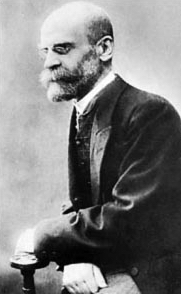 Emile D. Durkheim was born on the evening of April 15, 1858 at Epinal in Lorraine. His mother, Melanie, was a merchant’s daughter and his father was the Rabbi of Epinal and was also Chief Rabbi of the Vosges and Haute-Marne.
Emile D. Durkheim was born on the evening of April 15, 1858 at Epinal in Lorraine. His mother, Melanie, was a merchant’s daughter and his father was the Rabbi of Epinal and was also Chief Rabbi of the Vosges and Haute-Marne.
Emile spent part of his early school years in a rabbinical school destined to follow the footsteps of his father, grandfather and great grandfather, who had also been rabbis. However, this desire was short-lived as he cut away from Judaism after he arrived in Paris.
Emile Durkheim possessed a razor-sharp intellect and he excelled at the “College d’Epinal”, acquiring his baccalaureates in Letters and Sciences. He also made a name for himself with his outstanding performance in the Concours General. He left Epinal for Paris to prepare for admission into the Ecole Normale Superieur, but the emotional distress caused by his father’s illness affected his studies. Finally, in 1879 he passed the entrance examinations after his third attempt and was admitted at the age of 21. At the Ecole, Durkheim met and became friends with Charles Renouvier and Emile Boutoux, both philosophers. He also became friends with Numas-Denis Fustel de Coulanges, who was an historian. He successfully passed his tests, which was the most competitive examination required for admission to the teaching staff of state secondary schools, and started to teach philosophy in 1882. In 1887, Durkheim was appointed “charged ‘un cours de science sociale et de pedagoie” at Bordeaux. Not everyone was pleased by his appointment because he was a Social Scientist and the Faculty of Letters at Bordeaux was predominately humanist.
Throughout this Bordeaux period, Durkheim emphasized the value of sociology and also lectured on the theory, history and practice of education. He taught social science devoting his time on specialized studies like kinship, crime, law, religion, incest and socialism.
In 1896, Durkheim put aside his work on the history of socialism and put all his efforts into establishing a massive program of journalistic collaboration. In 1898, he founded the “Annee Sociologique,” the first Social Science Journal in France. It was supported by extremely intelligent young scholars and they provided an annual survey of sociological literature.
In 1902, Durkheim became a Professor.
Emile Durkheim returned to Paris with a reputation as a powerful force in Sociology and Education. His ideas of the “science of morality” antagonized the Catholics and his subsequent appointment to the Forborne angered those on the political right. Durkheim’s new appointment gave him a great deal of power. All students going for a degree in Philosophy, Languages, History or Literature were required to take his courses.
Tragedy struck Durkheim as his son Andre, a brilliant linguist, was killed at the Bulgarian front in the war between Germany and Belgium. He was declared dead in April 1916. This was a terrible blow to Durkheim from which he never fully recovered. He suffered a stroke and died a year later on November 15, 1917. He was 59 years old.
He is considered to be one of the most influential men in the evolution of sociology.
Major Works of Emile Durkheim
– The Division of Labor in Society, New York: Free Press, 1893
– The Rules of Sociological Method, New York: The Free Press of Glenco, 1895
– Suicide: A Study in Sociology, New York: The Free Press of Glenco, 1897
– The Elementary Forms of the Religious Life, New York: The Free Press, 1912
– Education and Sociology, 1922
– Sociology and Philosophy, 1924

It is perfect time to make a few plans for the longer term and it is time to be happy. I have read this post and if I could I desire to suggest you some attention-grabbing things or advice. Maybe you can write subsequent articles regarding this article. I wish to read more things approximately it!